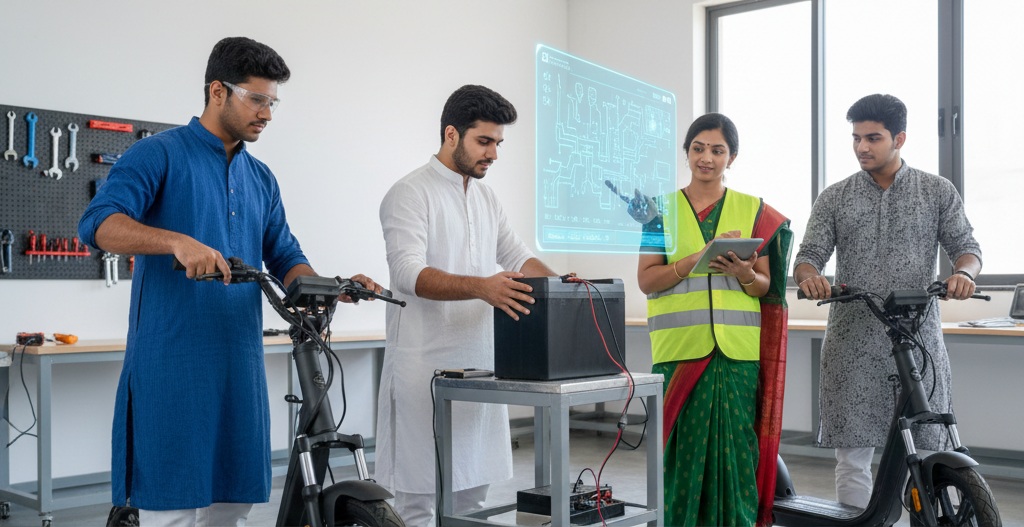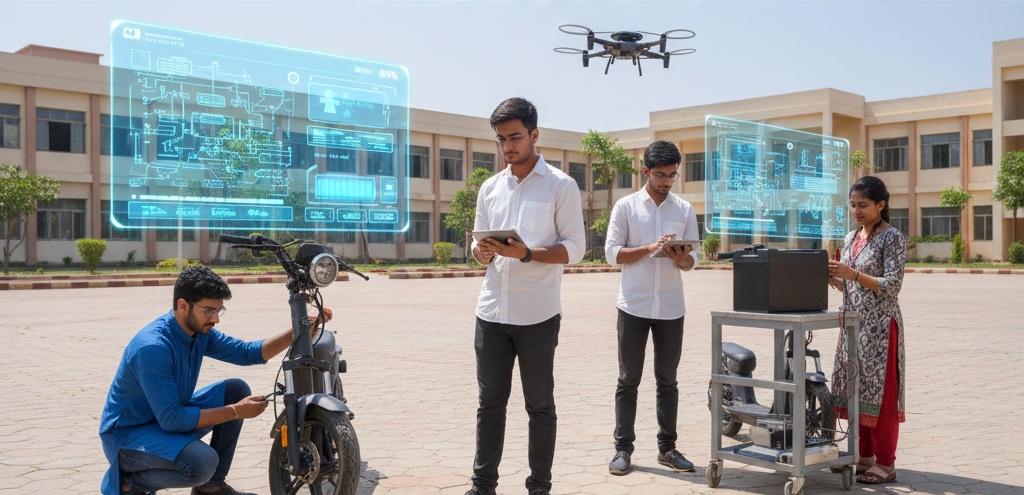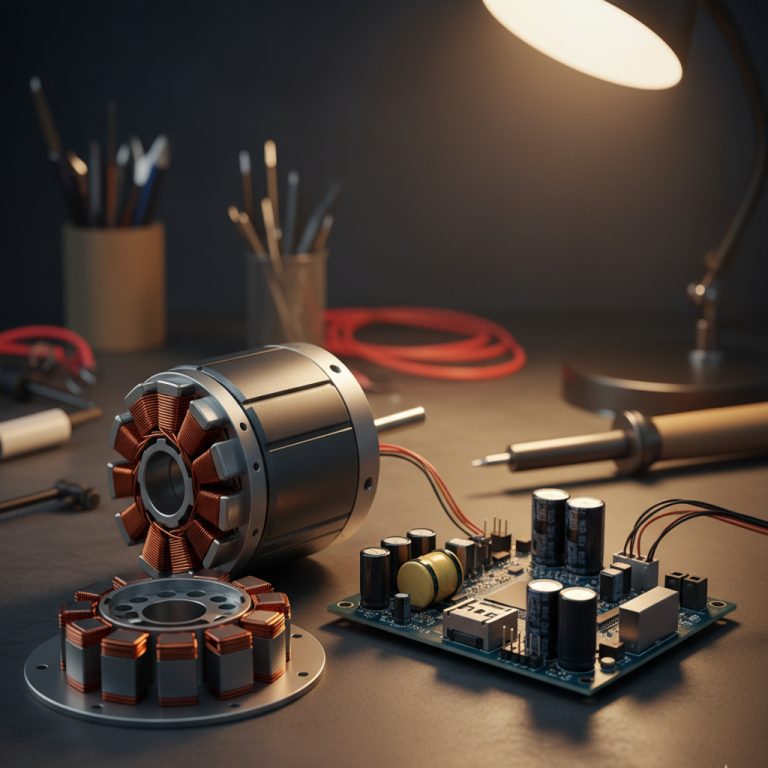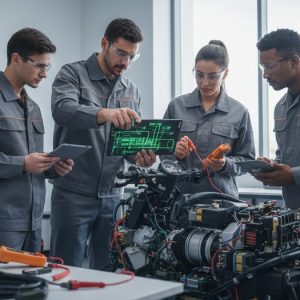EV Scooter Engineer Course
The EV Scooter Engineer Course is a practical training program focused on servicing, maintaining, and repairing electric scooters. It covers EV powertrains, battery systems, motors, controllers, charging systems, and safety procedures. Through hands-on workshops and real-world diagnostics, learners gain the skills required to keep electric two-wheelers operating efficiently and safely. This course prepares participants for technical roles in EV service centers, fleet operations, and electric vehicle manufacturing, supporting the growing adoption of clean mobility solutions.
- 72 Hours (2 hours/day x 6 days/week x 6 weeks) OR at your own pace
- Hindi, English
- Learn & Get Certified
- Basic & Intermediate
- Hands-On Training


Online Course Fees
Offline Course Fees
About this course
The EV Scooter Engineer Course is a 72-hour practical training program.
It is designed to equip learners with the skills required to assemble, service, troubleshoot, and maintain electric scooters used in personal mobility, delivery operations, and commercial fleets. The course integrates electrical, electronic, and mechanical training with hands-on workshops, enabling participants to confidently work on modern EV scooter systems.
Through structured modules, participants learn:
– Basics of electric mobility and EV powertrains
– EV scooter components: BLDC motors, controllers, throttles, sensors, displays
– Battery technologies: Li-ion packs, BMS fundamentals, charging systems, connectors
– Vehicle wiring harnesses, CAN communication (intro), and safety circuits
– Mechanical systems: brakes, suspension, chassis, wheels, transmission components
– Assembly and disassembly procedures for EV scooters
– Diagnosis of electrical faults: motor issues, BMS errors, controller failures, wiring problems
– Diagnosis of mechanical faults: brake wear, misalignment, bearing issues
– Use of diagnostic tools: multimeter, clamp meter, battery analyzer, fault scanner (where applicable)
– Preventive maintenance, performance checks, and repair workflows
– Safety guidelines, troubleshooting SOPs, and documentation practices
Hands-on training includes motor and controller testing, battery evaluation, harness repair, brake and suspension servicing, charging system checks, and complete EV scooter assembly and fault rectification.
By the end of the program, participants are prepared to:
– service and repair electric scooters used in daily mobility,
– diagnose electrical and mechanical issues using industry-standard tools, and
– work as EV Scooter Technicians, E-Mobility Service Engineers, or Workshop Technicians in EV service centers, startups, and fleet operations.
This course provides essential knowledge and practical training to build industry-relevant skills.
- Online Course Fees: ₹3500, ₹2500 (incl. GST) (Excluding tools & equipment cost)
- Offline Course Fees: ₹13500, ₹12000 (incl. GST) (Excluding tools & equipment cost)
- Certification: TCoE
- Duration: 72 Hours (2 hours/day x 6 days/week x 6 weeks) OR at your own pace
What you'll learn
After this course you will learn:
- EV Fundamentals: Understand the core principles behind electric mobility and two-wheeler EV systems.
- Battery Technology: Learn about battery types, charging methods, and Battery Management Systems (BMS).
- Motor & Controller Systems: Explore how BLDC motors and controllers power modern e-scooters efficiently.
- Assembly & Component Integration: Get hands-on experience assembling key parts of an electric scooter.
- Electrical & Wiring Techniques: Master safe wiring practices and circuit connections used in EVs.
- Testing & Troubleshooting: Diagnose performance issues and perform repairs like a professional EV technician.
- Energy Efficiency & Sustainability: Discover how EVs contribute to a greener, cleaner future.
- Industry Insights & Career Readiness: Gain exposure to current EV trends, market demand, and job opportunities in the growing electric mobility sector.
Course Content
Why take this course?
This course prepares you with hands-on skills to service, diagnose, and maintain electric scooters and their core systems, including batteries, motors, controllers, power electronics, and charging systems. You will learn safety procedures, fault identification, and repair techniques specific to electric two-wheelers. With the rapid adoption of EV scooters for personal and commercial mobility, skilled technicians are in high demand. This course equips you with job-ready expertise for service centers, fleet operators, and EV manufacturers, supporting the transition to clean and sustainable transportation.
How to use online TCoE platform?
Tools and Equipment required
National Skill Development Mission
Module-1: Introduction to EV and EV market
- This module introduces learners to the fundamentals of electric vehicles, with a focus on 2-wheeler scooters.
- It covers the working principles, components, and benefits of EVs compared to conventional vehicles.
- Additionally, the module provides an overview of the global and Indian EV market, trends, adoption drivers, and emerging opportunities, helping students understand the growing significance and potential of electric mobility in the 2-wheeler segment.
Module-2: Introduction of equipment and tools used
- This module familiarizes learners with the essential tools and equipment required for assembling, maintaining, and troubleshooting 2-wheeler electric scooters.
- It covers hand tools, multimeters, battery testers, torque wrenches, diagnostic devices, and safety equipment.
- Students will learn proper handling, usage, and maintenance of these tools, building the practical foundation necessary for working safely and effectively with EV scooter systems.
Module-3: Battery assembly for E-scooter
- This module guides learners through the process of assembling battery packs for 2-wheeler electric scooters.
- It covers cell types, series and parallel configurations, wiring, and integration with battery management systems (BMS).
- Emphasis is placed on safety, proper handling, and ensuring reliable connections, enabling students to build efficient and safe battery packs that power E-scooter systems effectively.
Module-4: Motor basics for E-scooter
- This module introduces learners to the fundamental concepts of electric motors used in 2-wheeler scooters, including DC, BLDC, and hub motors.
- It covers motor construction, working principles, key parameters, and their role in vehicle performance.
- Understanding motor basics equips students with the knowledge to select, operate, and maintain motors effectively in E-scooter systems.
Module-5: E-scooter electric system design
- This module focuses on designing the complete electric system of a 2-wheeler scooter.
- It covers the integration of batteries, motors, motor controllers, wiring, and auxiliary components to create a functional and efficient electric drive system.
- Students will learn principles of power distribution, system sizing, energy management, and safety considerations, enabling them to design a reliable and optimized electric system for E-scooter applications.
Module-6: Assembly of E-scooter
- This module guides learners through the step-by-step assembly of a 2-wheeler electric scooter.
- It covers mounting the chassis, integrating the battery pack, installing the motor and controller, and connecting electrical and auxiliary systems.
- Emphasis is placed on proper alignment, secure connections, safety practices, and quality checks, enabling students to assemble a fully functional E-scooter ready for testing and operation.
Module-7: Conversion of IC engine scooter to E-scooter
- This module introduces learners to the process of converting a conventional internal combustion (IC) engine scooter into an electric scooter.
- It covers removing the engine, installing the electric motor and battery system, integrating motor controllers, and rewiring electrical systems.
- Emphasis is placed on safety, proper component selection, and ensuring reliable operation, enabling students to transform an IC scooter into a functional, eco-friendly E-scooter.
Module-8: Testing of E-scooter and repair
- This module focuses on evaluating the performance, safety, and reliability of an assembled or converted E-scooter.
- Learners will explore techniques to test the battery, motor, controller, and overall electrical and mechanical systems.
- The module also covers troubleshooting common issues and performing repairs to ensure optimal functionality.
- By the end, students will be able to confidently test, diagnose, and maintain E-scooters for safe and efficient operation.
ENROLL TODAY & GET 30% OFF ON ALL COURSES
Your Future Can’t Wait, Enroll Now and Save 30% On All Courses.
Related Courses

EV Motors Engineer

EV 3-Wheeler Engineer

EV Fault Diagnostics Engineer

Electric Vehicles Engineer
See what our students have to say
With over a decade of experience, our mission is to produce future-ready skilled resources.
Battery Management System (BMS) in EV 2-Wheelers
The Battery Management System (BMS) is the heart of every electric scooter — it ensures the safety, efficiency, and longevity of the battery pack. In this topic, you’ll learn how the BMS monitors voltage, current, and temperature of each cell, balances charge levels, and prevents overcharging or deep discharging. You’ll also explore how smart BMS systems communicate with the motor controller to optimize performance and extend battery life. Mastering this topic gives you the foundation to design, test, and maintain reliable energy systems for modern EV scooters.
Job Opportunities
Here are some interesting job opportunities after completing the EV 2-Wheeler Scooter course:
-
EV Service Technician – Work with EV workshops or dealerships to inspect, repair, and maintain electric scooters.
-
Battery Assembly & Testing Engineer – Specialize in assembling, testing, and maintaining EV battery packs and BMS systems.
-
EV Production Assistant – Join manufacturing units involved in assembling electric two-wheelers and testing components.
-
EV Design & Development Assistant – Assist engineers in designing efficient scooter models and integrating electrical systems.
-
EV Diagnostics Specialist – Use tools and software to identify and solve performance issues in motors, controllers, and batteries.
-
Sustainability & Green Mobility Advocate – Work with startups or NGOs promoting clean transportation solutions.
-
EV Workshop Entrepreneur – Start your own service center specializing in electric 2-wheeler maintenance and retrofitting.
- EV Sales & Technical Support Executive – Combine technical know-how with customer engagement in the fast-growing EV market.
Frequently asked questions
What is the EV 2-Wheeler Scooter course about?
This course introduces you to the exciting world of electric scooters — covering everything from EV fundamentals, battery systems, and motor controllers to assembly, maintenance, and troubleshooting.
Do I need any prior technical knowledge to join this course?
No prior experience is required! The course starts from the basics and gradually builds your understanding through practical, hands-on sessions.
Will I get practical training on real EV scooters?
Yes! You’ll gain hands-on experience working with real EV components like batteries, motors, and controllers to understand how electric scooters are built and maintained.
What skills will I gain from this course?
You’ll learn EV assembly, wiring, battery management, system diagnostics, and repair techniques — skills that are in high demand in the EV industry.
Is this course suitable for students from non-engineering backgrounds?
Absolutely! The course is designed for anyone interested in electric vehicles — whether you’re a student, hobbyist, or professional looking to upskill.

